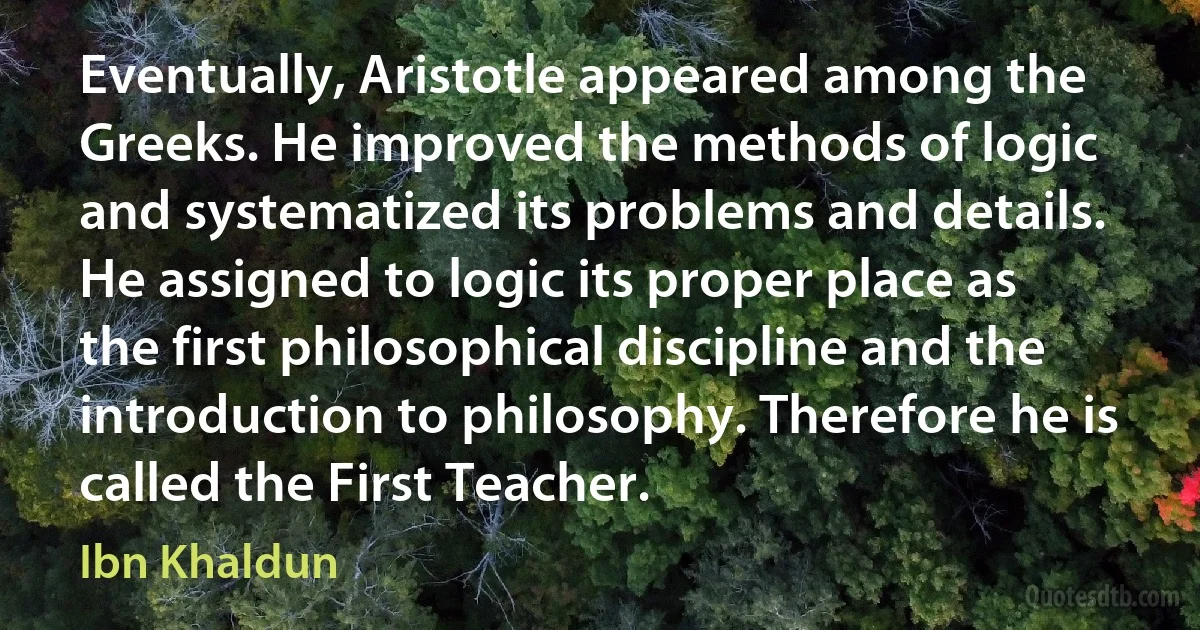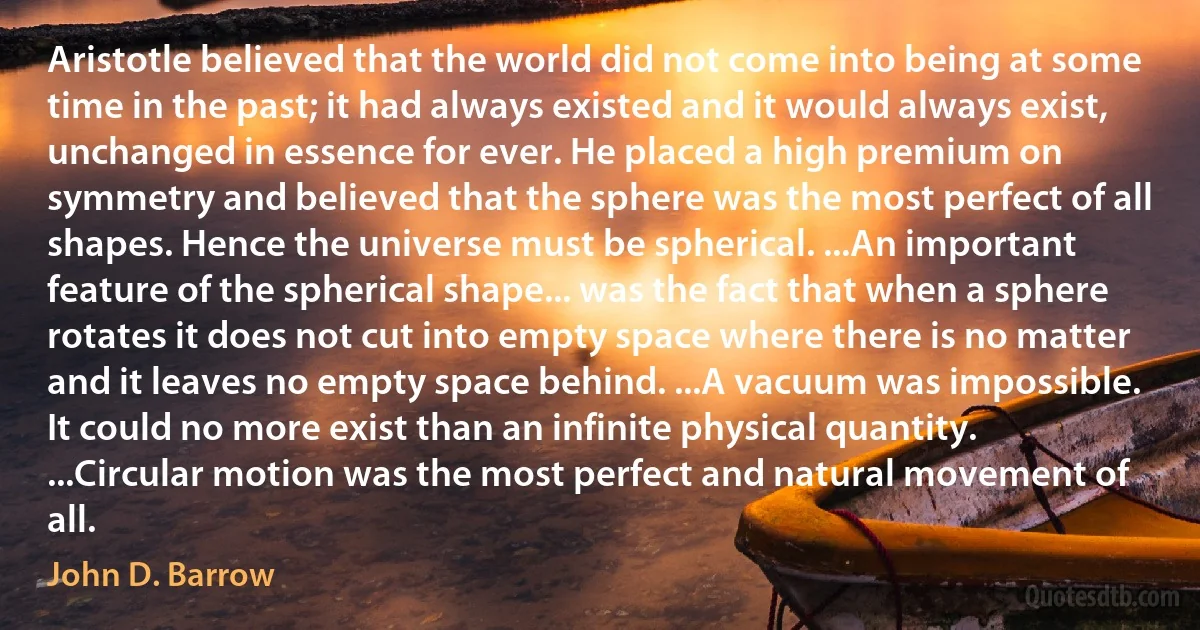Aristotle Quotes - page 5
I am almost amazed that you consider a professional philosopher capable of no confusion in concepts and definitions. Such things are nowhere more at home than among philosophers who are not mathematicians, and Wolff was no mathematician, even though he made cheap compen- diums. Look around among the philosophers of today, among Schelling, Hegel, Nees von Esenbeck, and their like; doesn t your hair stand on end at their definitions? Read in the history of ancient philosophy what kinds of definitions the men of that day, Plato and others, gave (I except Aristotle). But even in Kant it is often not much better; in my opinion his distinction between analytic and synthetic theorems is such a one that either peters out in a triviality or is false.

Carl Friedrich Gauss
Aristotle writes that persuasion is based on three things: the ethos, or personal character of the speaker; the pathos, or getting the audience into the right kind of emotional receptivity; and the logos, or the argument itself, carried out by abbreviated syllogisms, or something like deductive syllogisms, and by the use of example.

Randal Marlin
We cannot exert our understanding without from time to time understanding something of importance; and this act of understanding may be accompanied by the awareness of our understanding, by the understanding of understanding, by noesis noesos, and this is so high, so pure, so noble an experience that Aristotle could ascribe it to his God.

Leo Strauss
Through Plato, Aristotle came to believe in God; but Plato never attempted to prove His reality. Aristotle had to do so. Plato contemplated Him; Aristotle produced arguments to demonstrate Him. Plato never defined Him; but Aristotle thought God through logically, and concluded with entire satisfaction to himself that He was the Unmoved Mover.

Edith Hamilton
Coleridge observes that all men are born Aristotelians or Platonists. The latter feel that classes, orders, and genres are realities; the former, that they are generalizations. For the latter, language is nothing but an approximative set of symbols; for the former, it is the map of the universe. The Platonist knows that the universe is somehow a cosmos, an order; that order, for the Aristotelian, can be an error or a fiction of our partial knowledge. Across the latitudes and the epochs, the two immortal antagonists change their name and language: one is Parmenides, Plato, Spinoza, Kant, Francis Bradley; the other, Heraclitus, Aristotle, Locke, Hume, William James.

Jorge Luis Borges
Secondly, the educated citizen has an obligation to serve the public. He may be a precinct worker or President. He may give his talents at the courthouse, the State house, the White House. He may be a civil servant or a Senator, a candidate or a campaign worker, a winner or a loser. But he must be a participant and not a spectator. "At the Olympic games," Aristotle wrote, "it is not the finest and strongest men who are crowned, but they who enter the lists-for out of these the prize-men are elected. So, too, in life, of the honorable and the good, it is they who act who rightly win the prizes."

John F. Kennedy
Now here is a treasure, Averroës Commentaries on Aristotle in a tolerable translation from the Arabic by Gerard of Cremona.” He lasciviously stroked the red leather boards, knowing well how his pupil ached for the chance to pore through it. "A liar's gloss on a liar's lies. Surely this is a rare criminal.

Michael Swanwick
I had this sense that ideas about democracy, theories of democracy which I had learned about of course from graduate school on, from Aristotle and Plato onward, that they were inadequate. I don't want to diminish them; I have always retained a great respect for classical and medieval and eighteenth-century theory, but meanwhile a whole new kind of political system emerged to which the term democracy became attached, and for which democracy remained an ideal, even though classical democracy as an ideal was so far removed from reality. The gap between that ideal and the actual political institutions that had developed, particularly from about the sixteenth, seventeenth century on, was just enormous. And what we didn't have enough of, had very little of, was an adequate description of what the actual institutions of so-called democracy, modern democracy, representative democracy, were.

Robert A. Dahl
Aristotle said time is a measure of change, and this movie is about changing in time, through time, while remaining the same person. That's a philosophical paradox and a moral dilemma. But 'Casablanca' says it's possible. You can have both. That's what it means. And that's my wish for you: that you would have both.

Robert McKee
I think there is at least one moral theory of respectable lineage and good independent credentials that can accommodate such fairly minimal intuitions about us and animals. This is the theory Hume offers us. I do not consider Hume a forerunner of utilitarianism, and therefore what I shall go on to say in defense of Hume is not intended as a defense of any version of utilitarianism. I see Hume to be much closer to Aristotle than to Mill, to be offering us a theory about human virtues, not a theory about utility maximization and the duties that might involve.

Annette Baier
Robert [Grosseteste] became much interested in science and scientific method ... He was conscious of the dual approach by means of induction and deduction (resolution and composition); i. e., from the empirical knowledge one proceeds to probable general principles, and from these as premises one them derives conclusions which constitute verifications or falsifications of the principles. This approach to science was not that far removed from Aristotle ...

Carl B. Boyer
In its application to natural science Grosseteste based his method of verification and falsification on two assumptions about the nature of reality. (a) The first was the principle of the uniformity of nature, meaning that forms are always uniform in their operations.... In support of this principle he quoted 'Aristotles II de Generat.:...'the same cause, provided it remains in the same condition, cannot produce anything but the same effect.' (b) The second assumption Grosseteste made was that of the principle of economy, or lex parsimoniae. This he also derived from Aristotle, who stated it as a pragmatic principle.

Alistair Cameron Crombie
![And as for the close connection between philosophy and poetry, we can refer to a little-known statement by Thomas Aquinas in his Commentary on Aristotle's Metaphysics [I, 3]: the Philosopher is akin to the Poet in this, that both are concerned with the mirandum, the "wondrous," the astonishing, or whatever calls for astonishment or wonder. This statement is not that easy to fathom, since Thomas, like Aristotle, was a very sober thinker, completely opposed to any Romantic confusion of properly distinct realms. But on the basis of their common orientation towards the "wonderful" (the mirandum - something not to be found in the world of work!) - on this basis, then, of this common transcending-power, the philosophical act is related to the "wonderful," is in fact more closely related to it than to the exact, special sciences; to this point we shall return. (Josef Pieper)](https://cdn.quotesdtb.com/img/quotes_images_webp/50/josef-pieper-act-astonishment-311950.webp)


